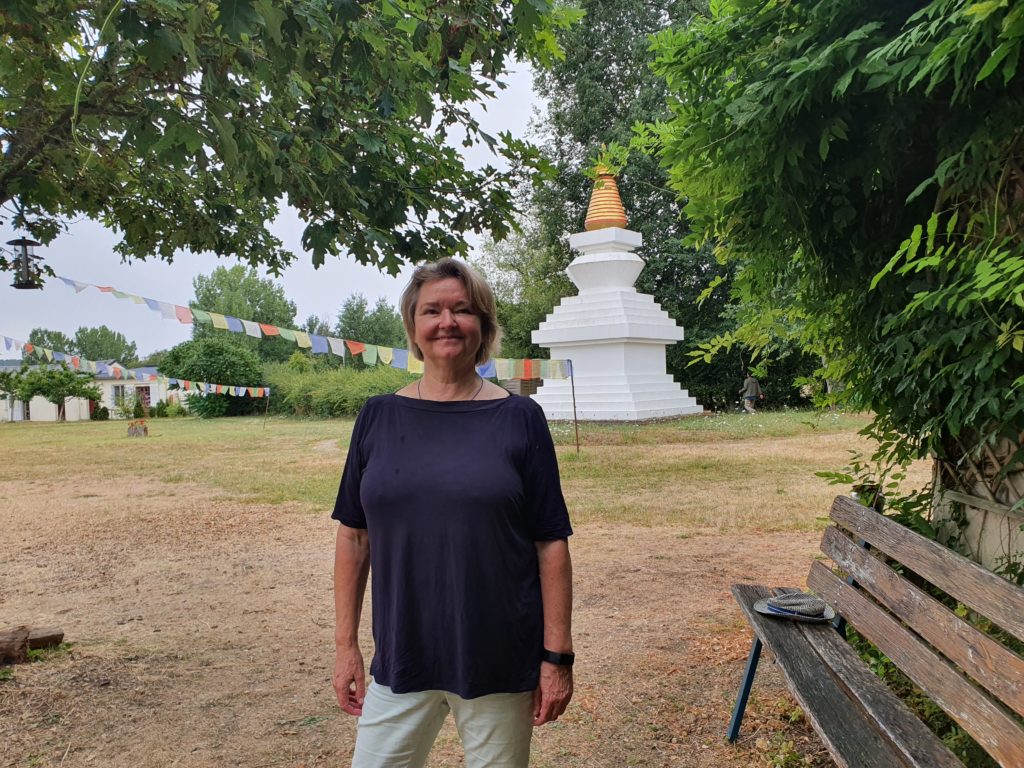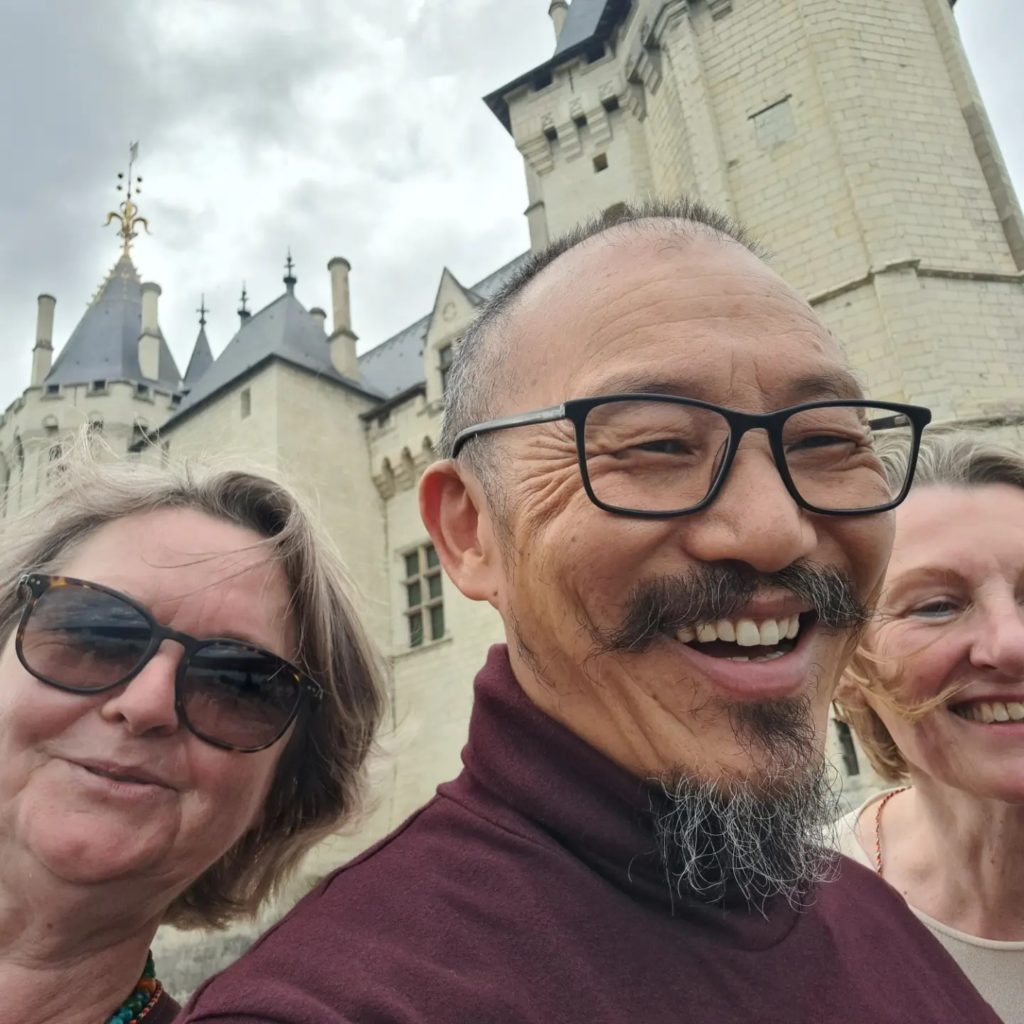Christine: Many people wished for a teaching and practice done step by step

Christine Trachte – Halder and her husband Norbert Halder are close students and friends of Khenchen Tenpa Yungdrung Rinpoche who is the abbot of Bon monastery of Triten Norbutse in Kathmandu. Together with him they manage Yungdrung Bon Stiftung, a foundation based in Germany which helps the monastery and projects affiliated to it. Christine also organizes Khenchen Rinpoche´s teaching in Budhasweg near Frankfurt.
Christine, you organized a cycle of teaching and practice in Germany, led by Khenchen Tenpa Yungdrung, which was sometimes called a “mini-gomdra”. What distinguished these retreats from others?
Our group met three times a year and received Dzogchen teaching from Khenchen Rinpoche step by step. We also train in Dzogchen meditation under his guidance. For me, it was a big difference compared to previous retreats. Before that, I could go and listen to teachings only during holidays. I worked as a schoolteacher and for logic reasons, I could not choose my holiday freely. So, for many years, I only picked parts of the teaching here and there, I never completed an entire cycle.

After I retired, I had more time and could afford the luxury to go to theses retreats, follow a teaching from the very beginning and practice accordingly. Khenchen Rinpoche went quite slowly, especially at the beginning, and he did every step with us, guiding our practice, practicing with us. Initially, there was only one teaching session, in the morning, and all other sessions were dedicated to practice. It was a wonderful, deep experience.
How many people registered for the “mini-gomdra” retreat?
Around one hundred people, mostly from Germany. Only a half or a bit more than a half of them arrived at the end of the cycle, but I think it is still a very good result. It went on for eight years! We started in 2015 and the cycle concluded last year. Of course, there were the covid years in between. For two years, 2020 and 2021, we could not meet.
Did other participants also feel the benefits of going through the whole cycle, did you get their feedback?
Very much. Everybody who stayed until the end said that their lives were changed very much for the better. Out of their gratitude, many of them became generous supporters of Yungdrung Bon Stiftung, helping to sustain the monastery and THIS, the school for the children from the Himalayas, which is our heart project.
We all went deeper in our meditation. We also became very close to each other, and one could feel that special kind of energy being there, and a sense of protection. The experience was quite unique and special for me.
Soon, the next cycle with Khenchen Rinpoche is going to start. But the format will be different. Can you explain it?
Again, Rinpoche is going to start from the beginning and go through the whole text, which is, in this case, Kusum Rangshar by Shardza Rinpoche, which refers to the Atri Dzogchen cycle, as an extensive commentary to its practice manual. The difference is the frequency: it will be only once a year, but the retreat will last six days. Another six-day long retreat with Khenchen Rinpoche in Germany will be organized in the spring and dedicated to a healing practice.

How did you happen to be the organizer of Rinpoche’s teaching?
In 2008, I joined the board of Yungdrung Bon Stiftung. The foundation was founded in 2000 by Wangden Kreuzer with the aim to support Triten Norbutse Monastery in Kathmandu, the home monastery of Yongdzin Rinpoche. 2008 was the year when the founder and his sister left the board.
In 2011 I became the main manager of the foundation and Norbert stepped in also, first as the treasurer and gradually taking on more duties. The foundation is surrounded and supported by many German practitioners who formed a community around it. We all used to meet during Yongdzin Rinpoche´s teaching in Germany once a year. The last year it was in 2014.
In the same year, I think, someone pointed out that people who have regular jobs have some difficulty attending a complete cycle of teaching. Those people longed for the possibility of receiving teaching from a teacher coming to Germany possibly a few times a year and teaching us on long weekends (from Friday to Monday), in a series of teachings. Many people really waited for something like this! And Khenchen Rinpoche agreed to it, committing to come three times a year. People were so enthusiastic about it! And I, in the role of the manager of Yungdrung Bon Stiftung, happened to organize it.
Christine, you also attended the meditation program of Shenten Dargye Ling, Gomdra. It extends over four years and lasts seventy days every year. This year is the last one of this cycle which started in 2019. What was your motivation to enter this program?
After I tasted the fruits of the “mini-gomdra” in Germany – if we can call it that way – I wished to go on longer retreats, and as soon as I could – after retiring – I applied for the Gomdra at Shenten. Unfortunately, this year, due to my health problems I had to leave after one month. But I really liked being there, I find the format very supportive.
Nobert, you have been following the teachings of Bon for a long time. When and where did you meet Lopon Yongdzin Tenzin Namdak Rinpoche?
I remember the first time I went to Lopon´s teaching was in Blanc in France in 2001. I think someone from the Dzogchen community of Namkhai Norbu told me about the retreat. I had gone to retreats with Namkhai Norbu Rinpoche and Sogyal Rinpoche before finding Bon. Lopon´s main topic is Dzogchen, and this is what I am interested in, that’s why I stuck to it. I do not understand much about tantra and do not have much connection with the ritualistic part of Buddhist and Bon teachings, I stay with what is understandable and clear for me – Dzogchen. I am not even particularly interested in which cycle the text is from, it is all one teaching, for me.
And you, Christine, how did you meet Bon?
At that time when Norbert went to Blanc, we already stayed together but I could not go with him because, as a schoolteacher, I did not have holidays. I went in 2003 when the teaching was organized in August, which is a good time for teachers. The teaching with Lopon felt very familiar to me, and we continued coming in the following years. We became a part of Rinpoche´s community and sangha. Compared to the teachings of Namkhai Norbu or Sogyal Rinpoche, these retreats were less crowded, which we liked.
What is your profession, Norbert?
I studied physics and I have been self-employed in the field of electronics.
And you said you worked as a teacher, Christine, right?
I studied to be a teacher, but I also studied communication and taught communication skills in commercial courses. After I moved to Norbert´s hometown in Bavaria, I worked as a teacher in all kinds of schools. I taught German and history in middle school and grammar schools, but I also worked with adults and with students of vocational training.
Allow me one personal question. You are both practitioners and you are husband and wife. Where did you meet?
Christine: Norbert and I met in August 1999 in Lerab Ling founded by Sogyal Rinpoche, as we were both Rinpoche´s students. I remember it very well. In October 2000, I moved from Westphalia to Bavaria, Norbert´s region, and we have stayed together since then. In 2003, as I said, I met Yongdzin Rinpoche and Khenchen Tenpa Yungdrung Rinpoche who, since the beginning, was accompanying Rinpoche during his teaching in the West.
Photo: Khenchen Tenpa Yungdrung, Jitka Polanská